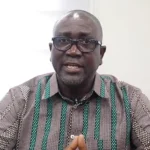
Executive Secretary of the National Media Commission (NMC), George Sarpong, is calling for civil society to take the lead in capacity-building for bloggers and emerging online creators, warning that leaving the responsibility solely to regulators could tilt the media environment toward government influence.
Speaking at the 2025 Media and Development Conference in Abuja, held under the theme “Reimagining Democracy, Development, and Data for the Next Decade,” George Sarpong stressed the need for a careful balance between media freedom and responsible regulation.
He noted that although bloggers now play a significant role in Ghana’s public information space, support for improving their professionalism should not be driven by regulatory bodies alone.
“I would want to partner with civil society to get this done,” he said. “If you left the regulators alone, they would lean towards government. And that is why a strong civil society partnership is the way forward.”
He explained that regulators naturally perform four core functions setting standards, monitoring those standards, enforcing them, and facilitating industry growth.
But he cautioned that when regulators dominate capacity-building, it risks weakening media freedoms.
According to him, civil society organisations are better positioned to lead training and support for bloggers, while regulators offer technical assistance to maintain quality and accountability.
“So whilst I completely agree with you on the need to offer any kind of capacity building to everybody who is participating in the public sphere, if there are resources for this to be done, I would want them in the hands of civil society with the regulatory support,” he added.
The comments come at a time when concerns about misinformation, online abuse, and declining media standards are prompting public calls for blogger regulation in Ghana. The NMC has consistently argued that reforms must protect press freedom while strengthening responsibility in the digital space.
The Abuja conference brought together policymakers, journalists, academics, and media development experts from across Africa to discuss the future of democratic governance and the role of data and emerging digital actors.
